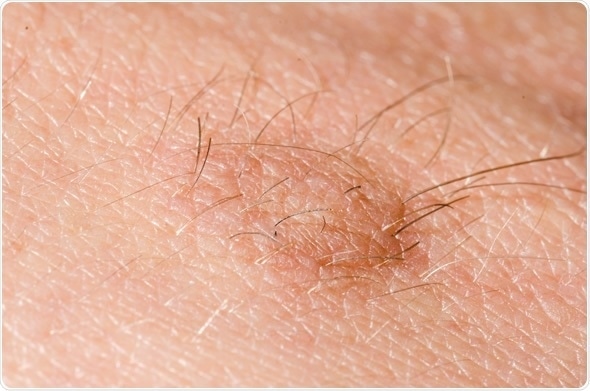Skin tags are practically harmless cutaneous growths on the skin that are predominantly composed of loose collagen fibers and blood vessels in the epidermis. They are known medically as acrochorda, fibroepithelial polyps, papillomas or soft fibromas and are typically flesh-colored or in some cases darkly pigmented.
Being benign in nature, skin tags usually do not undergo any transformations in terms of size, shape or color over time and are generally painless unless they are irritated by an external factor such as shaving or another skin pathology such as eczema. Thus, papillomas do not usually have the propensity to give rise to cancer, even if left untreated. Reports of malignant transformation are extremely rare.

Copyright: Roblan, Image ID: 161739161 via Shutterstock.com
Fibroepithelial polyps range in size from 1 mm to 5 cm, the latter being just smaller than the diameter of a tennis ball. Most papillomas are found primarily in the skin folds, in areas such as the neck, armpits, under the breasts, under-folds in the abdomen, buttocks and groin, while others may occur on the face, particularly on the eyelids. Some dermatological conditions that may resemble skin tags include but are not limited to moles, warts and cysts.
Predisposing factors and causes of papillomas
Acrochorda are quite common in the general population. It is estimated that at least 2 in 4 people will at some point in their lives develop these cutaneous lesions. They are not congenital (i.e. not present at birth) and while toddlers and young children may develop skin tags, particularly on the neck and underarms, the lesions are acquired mostly during adulthood, with an increased incidence in middle age.
Skin tags are more frequently found in obese or overweight people. They are believed to be a result of increased friction, which is created when the skin repeatedly rubs against itself, which explains the predominance of the lesions in skin folds. Papillomas are also known to increase in pregnant women owing to the elevation of hormones throughout gestation, especially during the second trimester.
It has been discovered that skin tags, through an unknown mechanism of action, tend to have an increased incidence whenever there is an elevation of blood glucose and insulin. This finding enables the lesions to be used as markers in persons who are at potential risk for diabetes mellitus type 2.
In addition to the aforementioned finding, some studies have found low-risk Human Papilloma Viruses 6 and 11 inside skin tags, thereby suggesting an etiological correlation. Other studies have suggested a possible link to the genetic susceptibility of developing skin tags.
The lesions are also infrequently seen in certain conditions such as Birt-Hogg-Dube syndrome, which is a rare autosomal dominantly inherited syndrome that gives rise to fibrous follicular, pneumothorax, pulmonary cysts and tumors of both kidneys.
The treatment and prognosis
Skin tags are not very concerning from a medical perspective and as a result do not necessarily need treatment, unless of course, it is a cosmetic wish or the lesions are affected due to a secondary condition.
If treatment is sought, there are a number of options available that can be conducted by general practitioners, dermatologists and other trained healthcare professionals. These include surgical excision and ligation where the lesion is cut, cauterization that burns the lesion and cryosurgery that involves the use of extreme cold with either liquid nitrogen, carbon dioxide or dimethyl ether to tear apart the lesions.
Further Reading
Last Updated: Apr 14, 2021